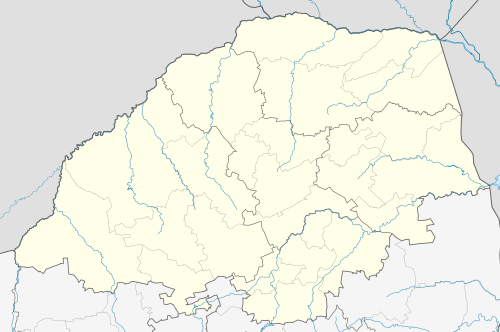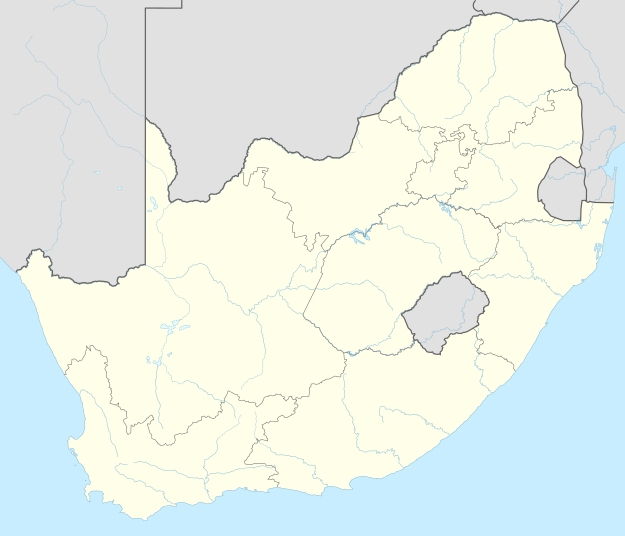Jane Furse
Jane Furse is a town in the Sekhukhune District Municipality of the Limpopo province in South Africa, surrounded by the villages of Ga-Molepane, Ga-Moretsele, Madibong, Mamone, Marulaneng, Moraba, Mokwete and Riverside.
Jane Furse Mmašadi | |
|---|---|
 Jane Furse  Jane Furse | |
| Coordinates: 24.761°S 29.877°E | |
| Country | South Africa |
| Province | Limpopo |
| District | Sekhukhune |
| Municipality | Makhuduthamaga |
| Area | |
| • Total | 8.00 km2 (3.09 sq mi) |
| Population (2011)[1] | |
| • Total | 6,533 |
| • Density | 820/km2 (2,100/sq mi) |
| Racial makeup (2011) | |
| • Black African | 99.6% |
| • Indian/Asian | 0.3% |
| • Other | 0.1% |
| First languages (2011) | |
| • Northern Sotho | 85.0% |
| • Swazi | 3.6% |
| • Zulu | 3.1% |
| • English | 2.8% |
| • Other | 5.6% |
| Time zone | UTC+2 (SAST) |
Significant landmarks in Jane Furse include Jane Furse Plaza, Jane Furse Memorial Hospital (the largest public sector hospital in the Sekhukhune District) and St Mark's College. A new shopping center, 'Jane Furse Crossing', opened in 2013 and is situated at the main four-way intersection in Jane Furse.
History
Jane Furse developed around the Jane Furse Memorial Hospital. The hospital was founded by the Rt. Revd Michael Furse, Bishop of Pretoria and is named after his daughter, Jane, who died at the age of 14.[2]
Government
Most of the land in Jane Furse falls under the authority of traditional leaders, known as Magoshi (singular = kgoshi). Kgoshi Mampuru Mampuru lays claim on much of Jane Furse while other parts of the town are under the disputed authority of other local chiefs.
Culture
The town is host to the Sekhukhune Community Radio. Other media serving the area include Thobela FM, the Polokwane-based South African Broadcasting Corporation (SABC) radio station and Capricorn FM, a commercial radio station also based in Polokwane.
A unique genre of music is found in Jane Furse and surrounding areas. Known as "Tja Manyalo" (wedding songs), this type of music is almost exclusively produced in and around Sekhukhune areas.
Sepedi language is the predominant language spoken in Jane Furse. Other languages include Swazi, Swati, and Southern Ndebele.
Education
Several primary and secondary schools are located in Jane Furse, catering to a student population estimated at 90,000. Most of the schools are public, with one private school. The list is as follows:
- Leap Science and Maths School
- St Mark's College
- St. Mark's Primary School
- Jane Furse Comprehensive School
- Jane Furse Primary School
- Arethabeng Primary School
- Bafedi Primary School
- Baropodi Comprehensive
- Kgolane Secondary School
- Lengama Secondary School
- Madibong Primary School
- Matsebong Secondary School
- Ngwana-matlang Secondary school
- Moretsele primary School
- Mookwane Primary School
- Lehutjwana Secondary School
- Bonega-Madikubung Primary School
- Dikgabje Primary School
- Mashegoanyane Primary School
Health facilities
Hospitals serving the area
- New Jane Furse Hospital
- St Ritas Hospital
Clinics
- Ditšhweung Community Clinic
- Madibong Community Clinic
Notable people
The following is a list of notable people associated with Jane Furse.
- Manche Masemola, Christian martyr
- Cabman Pucaso, South African recording Artist
- Godfrey Pitje[3], teacher, anti-apartheid activist and President of the ANC Youth League, succeeded by Nelson Mandela in 1951.
- Aaron Motsoaledi, Minister of Home Affairs
- Joe Phaahla[4], Deputy Minister of Health
- Elias Phakane Moretsele[5] ANC anti-apartheid activist and 1956 Treason Trialist
- Edgar Marutlulle, Blue Bulls Rugby player
References
- "Main Place Jane Furse". Census 2011.
- Elwyn Jenkins (2007-01-01). Falling Into Place: The Story of Modern South African Place Names. New Africa Books. p. 16. ISBN 978-0-86486-689-9.
- "Godfrey Mokgonane Pitje". South African History Online. 2 March 2012. Retrieved 2016-02-10.
- "Dr Mathume Joseph "Joe" Phaahla". South African History Online. Retrieved 2014-11-05.
- "Elias Phakane Moretsele". South African History Online. Retrieved 2017-03-15.
.svg.png)